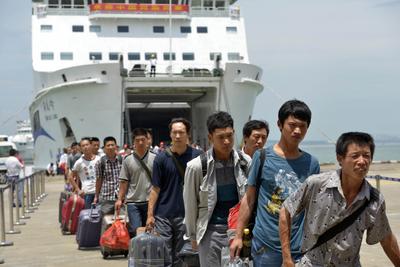Some of these demonstrations turned violent with a number of Chinese and foreign companies (mistaken as Chinese) damaged and several Chinese nationals killed. In response, Vietnam arrested hundreds of suspected rioters and China evacuated its workers. In the latest developments, a Vietnamese woman self-immolated in front of the Reunification Palace in Ho Chi Minh City on 23 May in protest and a Vietnamese fishing boat was reportedly rammed and sank in the area near the oil rig on 26 May.
Since the normalisation of ties in 1991, Vietnam has adopted a dual strategic position towards China: on the one hand it sees China as an indispensable economic and security partner; on the other hand it seeks to hedge against possible territorial encroachment by building up its naval forces and cautiously forging strategic ties with other powers. Renewed clashes over the Haiyang Shiyou981 oil rig, however, have made it difficult for Hanoi to sustain this strategic ambivalence.
The most obvious implication of the oil rig incident is that for the first time since 1991, Hanoi may be ruling out the ‘band wagoning’ option in its China policy. Back in 2008, when the two governments decided to elevate their relations to a ‘comprehensive strategic partnership’, Vietnamese Prime Minister Nguyen Tan Dung famously said that ‘the mountains and rivers of Vietnam and China are adjacent, cultures similar, ideologies shared, and destinies interrelated’. Now, after what he sees as a blatant violation of Vietnam’s sovereignty, Dung clearly stated ‘Vietnam never barters sovereignty for an unrealisable friendship’.
Does this mean Vietnam will move to counterbalance China’s influence in the region?
Vietnamese President Truong Tan Sang has openly stated that the country, while exercising restraint, will not back down in the defence of its sovereignty. Hanoi is reviewing all possible options including bringing China to a domestic or international court. And high-ranking leaders and senior diplomats have been busy travelling to regional capitals to seek international support. Beijing, meanwhile, continues to reject a multilateral solution to the tension.
Several of Vietnam’s strategic partners such as the US, Japan, India and the Philippines have already voiced concern over what they see as China’s growing unilateralism and assertiveness in territorial disputes.
Hanoi has engaged in regular consultations with Washington on how to react to the crisis. Washington has expressed its support should Vietnam decide to pursue legal action against China and the US Navy recently renewed its calls for more frequent visits to Vietnam. Interestingly, because the US views Vietnam as ‘the most strategic-thinking of all ASEAN countries’, rapprochement has now progressed to the point where strategic concerns outweigh ideological differences and Vietnam’s human rights record. Vietnam and the US signed a bilateral Nuclear Cooperation Agreement on 6 May. The next move will likely be for Washington to consider lifting its long-standing arms embargo on Hanoi.
Meanwhile, Tokyo is seeking Vietnam’s support in its attempt to revise Japan’s collective self-defence rights. Discussions on enhanced maritime security cooperation and Japan’s provision of patrol vessels to Vietnam, which had previously been delayed due to technical issues and Vietnam’s consideration of China’s reaction, have sped up in the wake of the Haiyang 981 incident. Negotiations will likely be wrapped up in late June during Japan’s foreign minister Fumio Kishida’s visit to Vietnam.
The possibility of worsening economic ties with China also means that Hanoi will try to consolidate its domestic market, foster closer economic ties with other important partners like the US, Japan, and ASEAN members, and take a more active role in TPP negotiations.
While it is seeking to build a ‘coalition of the willing’ to denounce China’s assertiveness, Vietnam has made clear that it will not change its non-alignment policy to enter a military bloc any time soon. The experience of living next to China for two thousand years has taught Vietnam that nurturing Sinophobia and engaging in military alliances to balance China won’t serve its long term interests.
Thuy T. Do is a PhD Candidate at the Department of International Relations, The Australian National University and a lecturer at The Diplomatic Academy of Vietnam.

